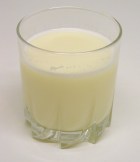By Monique N. Gilbert
Soy, and most soy-based products, are nutritional powerhouses. Soybeans are the only plant food that has all of the essential amino acids our bodyrequires, making it a complete protein. Soy foods do not have any cholesterol, and most are high in fiber. Soy also has many vitamins, minerals, and phytochemical compounds (like isoflavones) that work together to create numerous health benefits. Research shows that a daily intake of at least 25 grams of soy protein and 30-50 milligrams of isoflavones can improve and safeguard your health. This is the equivalent of 1-2 servings of soy foods a day.
Here is a list of soy's properties and how they can positively affect you.
To learn more, visit the Virtues of Soy website.
Author Bio ...Monique N. Gilbert is a Health Advocate, Soy Food Connoisseur, Recipe Developer and Author of... "Virtues of Soy: A Practical Health Guide and Cookbook" (Universal Publishers).
1. Soy's protein and isoflavones lower LDL (the bad) cholesterol and decrease blood clotting (thrombosis), which reduces the risk of heart attack and stroke.
2. Soy's protein and isoflavones provide antioxidants, reduce artery clogging plaque, improve blood pressure and promote healthy blood vessels, which protects the body from free radical damage, boosts the immune system, and lowers the risk of atherosclerosis (hardening of the arteries), heart disease, and hypertension (high blood pressure).
3. Soy's soluble fiber protects the body from many digestive related cancers, such as colon and rectal cancer. While its isoflavones may protect the body from many hormone-related cancers, like breast, endometrial (uterine) and prostate cancer.

4. Soy's protein enhances the body's ability to retain and better absorb calcium in the bones. While its isoflavones slow bone loss and inhibit bone breakdown, which helps prevent osteoporosis.
5. Soy's isoflavones help the body regulate estrogen when this hormone is declining or fluctuating, which helps alleviate many menopausal and PMS symptoms.
6. Soy's protein and soluble fiber help regulate glucose levels and kidney filtration, which helps control diabetic conditions and kidney disease.
http://www.hhnews.com/soy.htm



